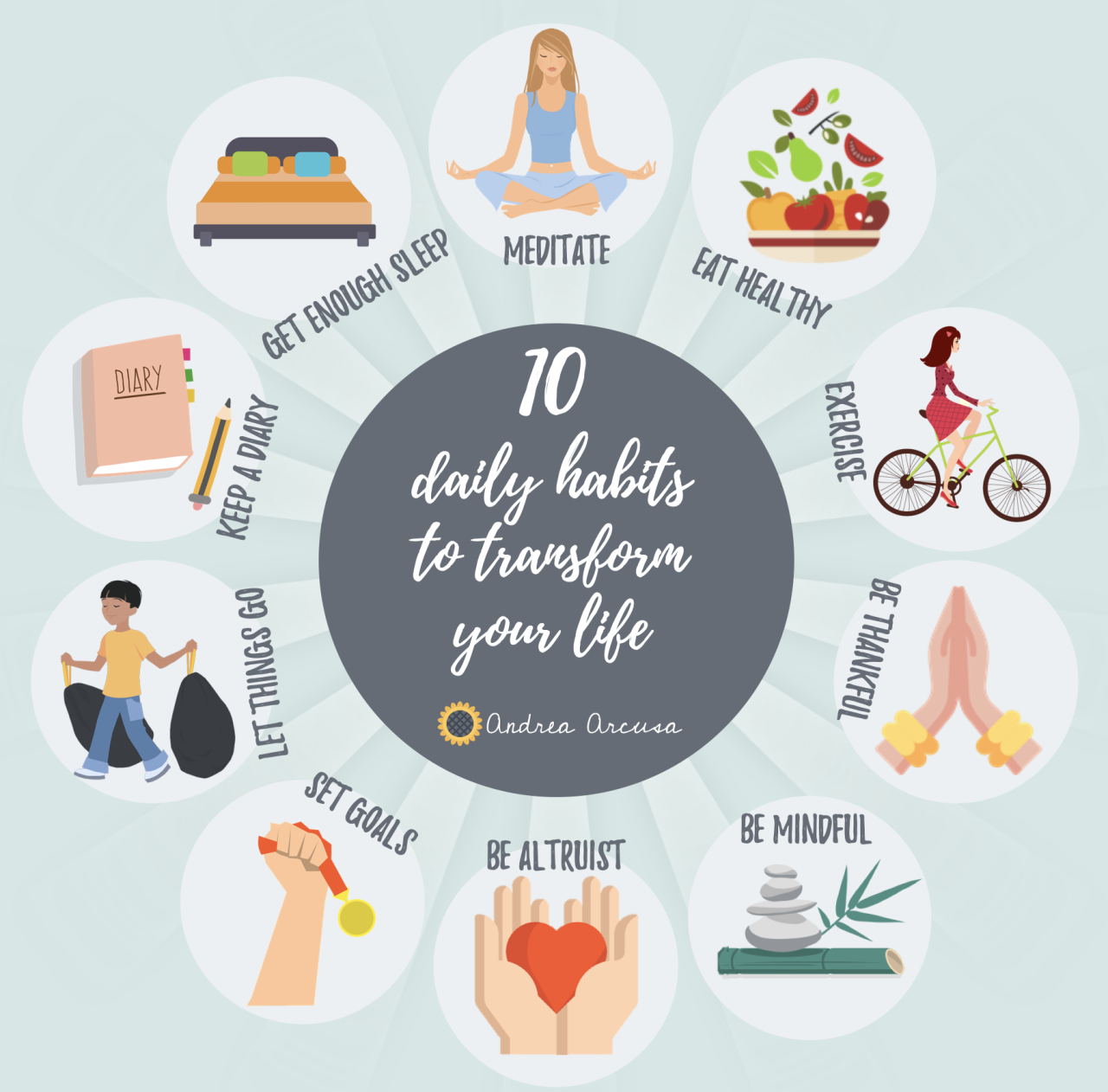
10 Daily Habits That Can Actually Change Your Life
10 Daily Habits That Can Actually Change Your Life – We all yearn for a life filled with purpose, joy, and fulfillment. But sometimes, the path to achieving those aspirations feels elusive. The secret, however, might lie in the small, seemingly insignificant habits we cultivate daily.
These habits, when consistently practiced, can ripple outward, transforming our lives in profound ways. Imagine waking up with a renewed sense of energy and clarity, feeling empowered to conquer your day. Picture yourself radiating positivity, navigating challenges with grace, and experiencing a deep sense of contentment.
This is the power of cultivating daily habits that align with your aspirations.
This article delves into ten powerful habits that have the potential to revolutionize your life. From prioritizing movement and mindful eating to embracing gratitude and forgiveness, each habit offers a unique opportunity for growth and transformation. While the journey may not always be easy, the rewards are worth the effort.
Let’s embark on this exploration together and discover how these simple practices can unlock a life of greater meaning and well-being.
Prioritize Quality Sleep
Sleep is an essential pillar of overall well-being, playing a crucial role in physical and mental health. Getting enough sleep is not merely about feeling refreshed; it significantly impacts cognitive function, emotional regulation, and physical health.
The Importance of Sleep for Optimal Health and Cognitive Function
Sleep is not a luxury; it’s a biological necessity. While we sleep, our bodies and minds work tirelessly to repair and restore themselves. During sleep, our brains consolidate memories, process emotions, and clear out toxins accumulated throughout the day. Adequate sleep is essential for maintaining optimal cognitive function, including memory, attention, and decision-making.
Studies have shown that chronic sleep deprivation can lead to impaired cognitive performance, reduced productivity, and increased risk of accidents.
Creating a Relaxing Bedtime Routine
A consistent bedtime routine signals to your body that it’s time to wind down and prepare for sleep. A calming routine can help reduce stress and anxiety, making it easier to fall asleep.
Here are some tips for creating a relaxing bedtime routine:
- Establish a Regular Sleep Schedule:Go to bed and wake up at the same time each day, even on weekends, to regulate your body’s natural sleep-wake cycle.
- Create a Relaxing Environment:Make your bedroom a sleep-conducive environment by ensuring it’s dark, quiet, and cool. Use blackout curtains, earplugs, or a white noise machine to minimize distractions.
- Avoid Caffeine and Alcohol Before Bed:Caffeine and alcohol can interfere with sleep quality. Avoid consuming them several hours before bedtime.
- Engage in Relaxing Activities:Wind down before bed with calming activities like taking a warm bath, reading a book, or listening to soothing music. Avoid watching TV or working on screens, as the blue light emitted from these devices can disrupt sleep.
- Limit Screen Time Before Bed:The blue light emitted from electronic devices can suppress melatonin production, a hormone that regulates sleep. Avoid using screens for at least an hour before bed.
The Connection Between Sleep and Emotional Well-being, 10 daily habits that can actually change your life
Sleep plays a vital role in regulating emotions. When we are sleep-deprived, our ability to manage stress, control impulses, and maintain emotional stability is compromised. Studies have shown a strong link between chronic sleep deprivation and increased risk of anxiety, depression, and mood disorders.
Cultivate Gratitude: 10 Daily Habits That Can Actually Change Your Life
Gratitude is a powerful emotion that can profoundly impact our lives. It’s the act of acknowledging and appreciating the good things in our lives, no matter how small. Cultivating gratitude can shift our perspectives, improve our well-being, and even boost our happiness.
Benefits of Gratitude
Practicing gratitude offers a range of benefits that contribute to a more fulfilling life. It can:
- Enhance Positive Emotions:Gratitude focuses our attention on the positive aspects of our lives, fostering feelings of joy, contentment, and optimism. This shift in perspective can lead to a more positive outlook overall.
- Reduce Stress and Anxiety:When we cultivate gratitude, we tend to worry less about things we can’t control. This can lead to a reduction in stress and anxiety levels, promoting a sense of calm and peace.
- Improve Sleep Quality:Gratitude practices before bed can help calm the mind and prepare it for restful sleep. Focusing on the good things in our lives can reduce racing thoughts and promote relaxation.
- Strengthen Relationships:Expressing gratitude to others strengthens bonds and deepens connections. When we acknowledge and appreciate the people in our lives, we foster a sense of closeness and mutual respect.
- Increase Resilience:Gratitude can help us cope with challenges and setbacks. By focusing on the good things in our lives, we can maintain a sense of hope and perspective, even in difficult times.
Gratitude Exercises
There are various ways to cultivate gratitude in our daily lives. Some effective exercises include:
- Gratitude Journaling:Writing down three things you’re grateful for each day can help you reflect on the positive aspects of your life. This practice can be done before bed or anytime you have a few minutes.
- Expressing Appreciation to Others:Take the time to express gratitude to the people in your life who make a difference. This can be through a simple “thank you,” a heartfelt note, or a thoughtful gesture.
- Mindful Meditation:Engaging in mindfulness practices can help you focus on the present moment and appreciate the simple things in life. This can involve paying attention to your senses, your breath, or the feeling of gratitude itself.
- Gratitude Walks:Taking a walk in nature and noticing the beauty around you can be a powerful way to cultivate gratitude. Pay attention to the colors, sounds, and smells of your surroundings.
Gratitude and Happiness
Research has shown a strong connection between gratitude and happiness. Studies have found that people who practice gratitude tend to experience higher levels of happiness and well-being. This is because gratitude helps shift our focus away from what we lack and towards what we have, fostering a sense of contentment and appreciation.
Engage in Meaningful Connections

Humans are inherently social creatures, and our connections with others play a vital role in our overall well-being. Strong social bonds provide us with a sense of belonging, support, and purpose, contributing to our mental, emotional, and physical health. Meaningful connections act as a buffer against stress, loneliness, and isolation, fostering a sense of community and contributing to a fulfilling life.
Strengthening Existing Relationships
Maintaining and nurturing existing relationships is crucial for fostering meaningful connections. Regularly connecting with loved ones, expressing appreciation, and engaging in shared activities can strengthen these bonds.
- Schedule regular time together:Dedicate specific time slots for spending quality time with family and friends, whether it’s a weekly dinner, a monthly movie night, or a weekend getaway.
- Engage in meaningful conversations:Go beyond superficial small talk and engage in deeper conversations that allow you to connect on a personal level. Share your thoughts, feelings, and experiences, and listen attentively to what others have to say.
- Offer support and encouragement:Be there for your loved ones when they need you. Offer a listening ear, a helping hand, or words of encouragement.
- Express gratitude and appreciation:Let those you care about know how much they mean to you. Express your gratitude for their presence in your life and for the positive impact they have on you.
Building New Connections
Expanding your social circle and building new connections can bring fresh perspectives, diverse experiences, and a sense of community.
Small changes add up, and 10 daily habits can truly transform your life. From mindful meditation to prioritizing sleep, there are countless ways to improve your well-being. But while we focus on personal growth, it’s crucial to acknowledge the broader societal issues that impact us all.
For instance, recent events have highlighted the urgent need for responsible gun control, as texas gun laws allow 18 year olds to buy ar 15s the weapons used in uvalde shooting , demonstrating the devastating consequences of lax regulations.
By working towards a safer future, we can create a better world for ourselves and future generations, making those daily habits even more impactful.
- Join clubs or groups:Participate in activities that align with your interests, such as book clubs, sports leagues, volunteer organizations, or hobby groups. This can provide opportunities to meet like-minded individuals and build connections based on shared passions.
- Attend social events:Make an effort to attend social gatherings, such as parties, community events, or networking events. These events can offer opportunities to meet new people and expand your social circle.
- Volunteer your time:Giving back to your community can be a rewarding way to connect with others and make a difference. Volunteering can provide opportunities to meet people with similar values and interests, fostering a sense of purpose and belonging.
- Be open to meeting new people:Approach conversations with an open mind and a willingness to connect with others. Strike up conversations with people you encounter in your daily life, such as at the grocery store, the gym, or at a coffee shop.
Practice Self-Care
In the whirlwind of daily life, it’s easy to get caught up in the demands of work, relationships, and responsibilities, leaving little time for ourselves. However, prioritizing self-care is not a luxury but a necessity for overall well-being. It’s about taking intentional steps to nurture your physical, mental, and emotional health, allowing you to recharge and thrive.Self-care encompasses a wide range of activities that promote relaxation and rejuvenation.
These practices can be as simple as taking a warm bath or as involved as spending time in nature. The key is to find activities that bring you joy, reduce stress, and help you feel grounded.
The Benefits of Self-Care
Self-care is not about being selfish; it’s about recognizing that you can’t pour from an empty cup. When you prioritize self-care, you are better equipped to handle life’s challenges and show up for others in a more positive and supportive way.
Self-care practices have been linked to numerous benefits, including:
- Reduced Stress and Anxiety:Stress and anxiety can take a toll on your physical and mental health. Self-care activities can help to reduce stress hormones, promote relaxation, and improve your mood. For example, engaging in activities like yoga, meditation, or deep breathing exercises can help to calm your nervous system and alleviate anxiety.
Building those 10 daily habits can feel like a marathon, but it’s worth it. Remember, small changes add up! It’s interesting to see how the recent epic goods buying spree wanes as consumers ramp up services spending might reflect a shift in priorities.
Maybe people are realizing that experiences and services offer a more lasting impact than material possessions. Either way, sticking to those daily habits can help us find more joy and fulfillment, no matter what the economic climate throws our way.
- Improved Sleep Quality:Sleep is essential for physical and mental restoration. Self-care practices like taking a warm bath, reading a book, or listening to calming music can help to create a relaxing bedtime routine that promotes better sleep.
- Increased Energy and Focus:When you’re well-rested and feeling refreshed, you’re more likely to have the energy and focus to tackle your tasks effectively. Self-care can help to boost your energy levels and improve your concentration.
- Enhanced Emotional Well-being:Self-care practices can help you to connect with your emotions, process difficult experiences, and develop healthy coping mechanisms. Engaging in activities like journaling, talking to a therapist, or spending time with loved ones can promote emotional well-being.
- Improved Physical Health:Self-care practices like exercise, healthy eating, and getting enough sleep can contribute to overall physical health and well-being. These practices can help to reduce the risk of chronic diseases and improve your overall health.
Embrace Learning and Growth

The world is constantly changing, and to thrive in this dynamic environment, it’s crucial to embrace continuous learning and personal development. It’s not just about acquiring new knowledge; it’s about fostering a mindset that welcomes challenges, embraces new perspectives, and strives for improvement.
It’s easy to get caught up in the daily grind, but taking the time to cultivate positive habits can truly transform your life. From mindful meditation to prioritizing sleep, there are countless ways to improve your well-being. And while the world might be buzzing about the latest Twitter drama, forget twitter this musk is into toe curling yumminess , remember that true change comes from within.
So, focus on those small, consistent steps, and watch as they build into a life you truly love.
Ways to Incorporate Learning into Daily Routines
Integrating learning into daily life can be as simple as incorporating a few new habits. Here are some practical ways to make learning a regular part of your routine:
- Read Books:Dive into fiction or non-fiction books that spark your curiosity or align with your professional goals. Reading expands your vocabulary, broadens your understanding of diverse perspectives, and stimulates critical thinking.
- Listen to Podcasts:Podcasts offer a convenient way to learn while commuting, exercising, or doing chores. Choose podcasts that cover topics that interest you, from history and science to personal development and current events.
- Take Online Courses:Platforms like Coursera, edX, and Udemy offer a vast array of courses on various subjects, from coding and design to business and personal finance. You can learn at your own pace and acquire valuable skills that can enhance your career or personal life.
- Attend Workshops and Seminars:Participate in workshops and seminars related to your interests or career goals. These events provide opportunities for hands-on learning, networking, and gaining insights from experts in the field.
The Connection Between Learning and Personal Growth
Learning and personal growth are intrinsically linked. When you engage in learning, you challenge your existing beliefs, expand your knowledge base, and develop new skills. This process fosters self-awareness, builds confidence, and empowers you to navigate challenges and opportunities with greater resilience and adaptability.
“The only source of knowledge is experience.”
Albert Einstein
Practice Forgiveness
Forgiveness is a powerful act of self-compassion and emotional liberation. It’s not about condoning harmful actions; it’s about releasing the grip of resentment and bitterness that can weigh us down. By practicing forgiveness, we break free from the shackles of the past and open ourselves to a brighter future.
The Benefits of Forgiveness
Forgiveness offers numerous benefits for our emotional well-being. It reduces stress, improves mental health, and strengthens relationships.
- Reduces Stress and Anxiety:Holding onto anger and resentment can create a constant state of stress and anxiety. Forgiveness allows us to let go of these negative emotions, leading to a sense of peace and calm.
- Improves Mental Health:Forgiveness has been linked to improved mental health, including reduced symptoms of depression, anxiety, and post-traumatic stress disorder (PTSD).
- Strengthens Relationships:Forgiveness can repair damaged relationships by fostering trust and understanding. It allows us to move forward from conflicts and build stronger bonds.
Forgiveness Practices
There are various practices that can help us cultivate forgiveness.
- Journaling:Writing about our feelings and experiences can help us process our emotions and develop a more compassionate understanding of ourselves and others.
- Meditation:Meditation can promote mindfulness and self-awareness, allowing us to observe our thoughts and emotions without judgment.
- Seeking Professional Support:If we struggle with forgiveness, seeking support from a therapist or counselor can provide guidance and tools for healing.
Final Summary

The journey of cultivating these habits is a personal one, and the key lies in finding what resonates with you. Remember, consistency is key. Even small, incremental changes over time can lead to remarkable results. Embrace the process, be patient with yourself, and celebrate each milestone along the way.
You have the power to create the life you desire, one habit at a time. So, take a deep breath, choose a habit to focus on, and embark on this transformative journey. You’ll be amazed at the positive impact it can have on your life.




